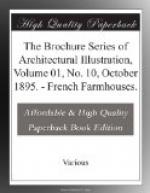[Illustration: Sketch by Wilson Eyre, Jr. See The Architectural Review, Vol. IV, No. 1.]
[Illustration: LXXVIII. Manoir d’Ango, Normandy.]
The “P.D’s.”
(Continued from page 123.) [Transcriber’s Note: issue 8]
And speaking of costumes reminds me of some very successful ones, and particularly that of a Highlander, the whole of which was made on the spot from the club’s “props” and was complete even to a practical bagpipe, which was composed of three tin horns, a penny whistle, a piece of burlap, and a rubber tobacco pouch. Both in tone and looks it was an exceedingly good imitation of the genuine article.
One of the things that has afforded the P.D.’s a great deal of amusement is a supposititious newspaper, wherein the members are interviewed on any and all occasions and many interesting things brought to light. In one of them, for instance, Ictinus confides to the reporter that he was born in the shadow of the Parthenon. This mixing up of one’s peculiarities, habits, and nationality with those of the illustrious individual whose name he bears, is capable of being given many laughable twists and has been taken advantage of in many amusing skits.
Besides the interviews there are fashion notes, society and sporting notes, architectural news, and receipts. Among the latter is a receipt for making Welsh rare-bits that should be in the possession of every one addicted to them.
[Illustration: The “P.D.’S” Prepared for work.]
The club has been regaled at various times with comic opera (with scenery painted for the occasion), readings and recitations; and at one of the annual dinners an illustrated history of the club and its members was given on an ingeniously contrived miniature stage.
Every dinner, every voyage of discovery, every reception, and in short anything happening that would be of interest to the absent members, is written up by some one for their edification. The P.D.’s out-Wegg Mr. Wegg in the matter of dropping into poetry, and although its quality cannot be presumed to approach that selected by that famous individual for the delectation of Mr. Boffin, it being, not to mention the matter of theme, very often afflicted with a deplorable weakness or strength in its feet, yet it can be said of it, as in the case of Mercutio’s wound, that it serves.
[Illustration: Corner in the “P.D.’S” Rooms.]
Most of these literary efforts eventually find a place in the scrapbook, and their perusal reminds us of many a joyous evening.
“We seem to see, to taste, to hear,
Joys that have passed; who say too fleet
The rush of time? Things passed are
dear.”
This, then, is a slight account of the P.D.’s, and if their doings be branded as folly, it is to them at least a very innocent and delicious sort of folly, and just the thing to free them from the perplexing problems of the day and fit them to grapple with a freshened and renewed energy those of the morrow.




